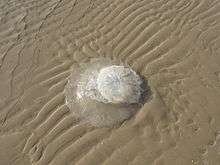Rhopilema nomadica
Rhopilema nomadica, the nomad jellyfish, is a jellyfish indigenous to tropical warm waters of the Indian and Pacific Oceans. Since 1970's it has been also found in Mediterranean Sea, where it entered via the Suez Canal (Lessepsian migration). It has been found in the Eastern Mediterranean,[1] off the coast of Israel, Turkey, and in the Aegean Sea off the coast of Greece.[2] R. nomadica's body is light blue and the bell is rounded. It can grow up to 10 kg of weight, and its bell is commonly 40–60 cm in diameter, but can be up to 90 cm. The European Union lists it as one of the worst invasive marine species in European waters.
| Rhopilema nomadica | |
|---|---|
 | |
| Scientific classification | |
| Kingdom: | Animalia |
| Phylum: | Cnidaria |
| Class: | Scyphozoa |
| Order: | Rhizostomeae |
| Family: | Rhizostomatidae |
| Genus: | Rhopilema |
| Species: | R. nomadica |
| Binomial name | |
| Rhopilema nomadica Galil, 1990 | |
Effects on humans
R. nomadica can cause very painful injuries to humans, since it has vermicular filaments, which are covered in venomous stinging cells, in the mouth arms. The R. nomadica had caused the largest numbers of envenomisations along the southern Levant coast. These jellyfishes are notorious for the large swarms they form in the summertime. The R. nomadica have caused a socioeconomic problem in Israel because of such outbreaks, during which they can release their venomous stinging cells. The outbreak has caused seaside visits to be reduced from 3-10.5%, causing a monetary loss of $6 million for recreational beaches.
Their presence can clog up seawater intake systems, such as those used by seawater-cooled power plants.[3][4]
Nutrition
R. nomadica are planktotrophic, meaning that they feed off of plankton for their nutritional and survival needs.
Environmental Needs
R. nomadica are seen to survive in various water temperatures. They can survive from anywhere from 16 degree Celsius to 31 degree Celsius.
References
- Jellyfish Invading Mediterranean through Suez Canal
- RHOPILEMA NOMADICA: A POISONOUS INDO-PACIFIC SCYPHOMEDUSAN NEW TO THE MEDITERRANEAN COAST OF TURKEY Archived 2015-09-24 at the Wayback Machine
- Schuster, Ruth (28 June 2017). "These Photos of Jellyfish Clogging an Israeli Power Plant Are a Reminder of How Icky Nature Is". Haaretz. Retrieved 28 June 2017.
But they are a particular bane to the Israel Electric Corp., which has five seawater-cooled power stations along the Mediterranean coast. The stations installed filters over their seawater intake systems, but when the jellyfish swarm, they can overwhelm the systems, the company told Haaretz.
- Schuster, Ruth (25 June 2015). "Israeli Power Plant Fights Off Giant Jellyfish Swarm". Haaretz. Retrieved 28 June 2017.
Our coal-fired power stations are located by the sea because it takes a lot of water to cool them down," Israel Electric Corp spokeswoman Iris Ben-Shahal told Haaretz. "At that entry point of the water into the cooling systems, we have filters to keep foreign bodies out. The jellyfish, and other things like sea plants, stick to the filters and clog them.
Further reading
- Ghermandi, Andrea; Galil, Bella; Gowdy, John; Nunes, Paulo A.L.D. (2015). "Jellyfish outbreak impacts on recreation in the Mediterranean Sea: Welfare estimates from a socioeconomic pilot survey in Israel". Ecosystem Services. 11: 140–147. doi:10.1016/j.ecoser.2014.12.004.
- “Rhopilema Nomadica (Nomad Jellyfish).” Rhopilema Nomadica (Nomad Jellyfish), 25 Sept. 2018, www.cabi.org/isc/datasheet/108185.
- Galil, Bella; Marchini, Agnese; Occhipinti-Ambrogi, Anna; Ojaveer, Henn (2017). "The enlargement of the Suez Canal—Erythraean introductions and management challenges". Management of Biological Invasions. 8 (2): 141–152. doi:10.3391/mbi.2017.8.2.02.
| Wikimedia Commons has media related to Rhopilema nomadica. |